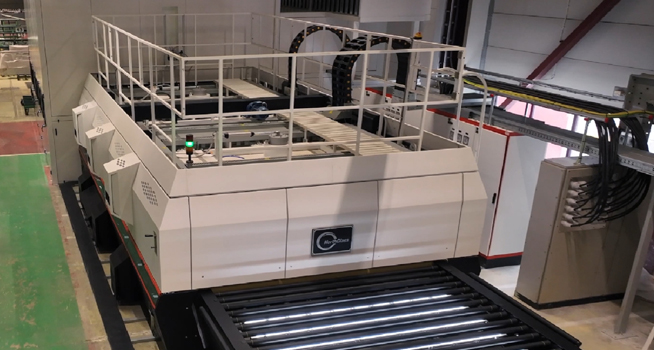On May 2, the Pilkington Norge AS plant in Elverum, Norway, held the official opening ceremony for the new toughening furnace.
A bit of history: Østlandske Isolerglas is the old name of Pilkington Norge AS factory in Elverum which was established in the mid-70s.
Industrial production of insulating glass units sealed with butyl started early in 1982. It was the main product right up until 1984 and the first construction stage of a new factory was under way. In this connection, one of Norway’s first horizontal toughening furnaces for flat glass was installed. During the 80s and 90s, the factory in Elverum was a major supplier of front panels and internal glass for ovens for Elektrolux, Grepa, and white goods for customers such as Derby, and various furniture manufacturers who made cabinets with glass shelves of various designs.
During these years, the factory also became a major supplier of IGUs with screen-printed toughened glass panels for buses in Sweden and Norway.
In 1986, the factory was once more expanded to make room for grinding, screen printing and enamelled glass production (toughened spandrel glass with colour). Eventually there was a need for even more space and in 1998 the factory was expanded with a new glass hall and grinding hall. Since the turn of the century, the factory changed its name from Østlandske Glassindustri to Pilkington Norge AS and since 2006 it has become part of the NSG Group.
In connection with the first construction stage in 1984, a used toughening furnace was installed which was replaced with a new used one in August 1992. This has now been working steadily until today and has now been replaced with a fifth generation fully digitally controlled toughening furnace from NorthGlass with a length of 25 metres.

The new furnace toughens glass horizontally and can toughen glass sizes from 100 by 300 millimetres to 2,440 by 5,000 millimetres. The oven is fully digitally controlled, which simplifies production work.
Digital control means that the toughening process is controlled by the machine, which has been set in advance with information about glass type, thickness and size. The machine controls itself over and under heating and cooling. Sensor systems control the toughening process and ensure flat toughened glass of high optical quality. The way to optimal toughening has consisted of countless hours of fine-tuning, but in the end the result is perfect.

Characteristics
Full digital control that simplifies production work. The toughening processes are controlled by the machine based on glass types/glass thicknesses/sizes:
- 4-19 millimetre float, 4-10 millimetre coated glass and maximum size 2,440 by 5,000 millimetres;
- Intelligent control of over/under heating and cooling;
- Toughens glass with high optical quality;
- Improved and stable glass quality.
This will improve efficiency of Elverum plant, increasing its capacity with opportunities to process more products.
Detailed tests have been carried out to ensure that the glass is toughened in accordance with the expected quality.
Noise-reducing cabin
A noise-reducing cabin has been set up on the furnace to meet standards for noise transmission in the workplace.
At the top of the “hut” there is a hot air outlet which releases the heat over the roof in the summer. The hatch can be opened in the cold seasons to use the heat produced by the oven to heat the hall in the winter.






